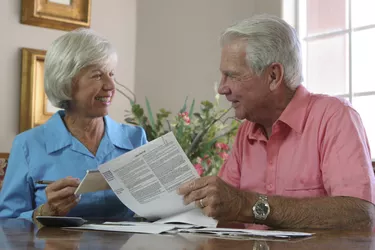
Arizona seniors have several options for lowering their property taxes. All of them have financial and other qualifications -- simply being a senior homeowner, by itself, is never enough. The tax breaks aren't in conflict, so a senior can try applying for more than one. To apply, a homeowner submits the appropriate paperwork to the county tax assessor.
Freezing Value
Video of the Day
An Arizona homeowner 65 years or older can apply to her county assessor for a three-year value freeze on her house and up to 10 acres of land around it. While the freeze is in place, the taxable value of the property can't go up, though the property tax rate can increase. The senior must have income under $30,576 at time of writing -- $38,220 for a two-owner house -- and have lived there at least two years. An applicant must file Arizona Department of Revenue form 82104, along with the necessary documentation showing she qualifies.
Video of the Day
Deferring Taxes
After a homeowner turns 70, he can apply for a tax deferral. This doesn't eliminate tax, but it postpones paying property tax until the owner dies, sells the house or moves away. The owner must have lived there six years, or in Arizona for 10 years, and the total Arizona income of everyone living at the house must be under $10,000. The owner cannot qualify for deferral if he owes any back property tax.
Widows and Widowers
If the homeowner is a widow or widower and has not remarried, she can apply for a tax exemption at any age. She must be a current Arizona resident, and have lived in Arizona at the time of her spouse's death. As of 2015, the home's net assessed value can't be above $25,306, equal to a cash value of around $253,000. The total household income must be under $31,035, or $37,231 if children under 18 live there. Someone who's completely disabled can apply for the same exemption.
Applying for Exemption
The maximum exemption is $3,724 for widows, widowers and the disabled at time of writing. This doesn't count any Social Security benefits the homeowner is receiving. The applicant must own the property on Jan. 1 and file the paperwork between Jan. 2 and March 2. He must bring in a certificate of disability or his spouse's death certificate, depending on the grounds for requesting exemption. The tax break only applies to the current year -- it can't lower any back taxes.